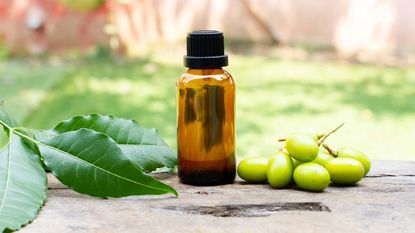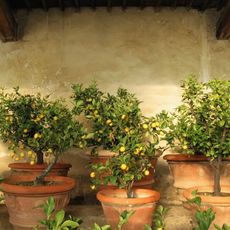Azadirachtin vs. Clarified Hydrophobic Extract of Neem Oil


We all want to protect our environment and fulfill our responsibilities as good stewards of the land. To that end, many gardeners seek alternatives for pest control in the landscape. Short of manually squashing every bad bug you come across, organic gardening pesticides that can cover a large area are the smart alternative.
Safer® Brand has been a trusted manufacturer to generations of gardeners, and their research and development is unsurpassed in the industry for pesticide products that comply to organic standards and minimize risk to beneficial insects and the environment.
Top selling products bear ingredients like Azadirachtin and clarified hydrophobic extract of neem oil. What are these ingredients and how are they used? Both compounds stem from the amazing neem tree, a plant with numerous potentials both in the pesticide and health fields.
The neem tree (Azadirachta indica) is a fast growing tree native to tropical and sub-tropical regions of the world, primarily the Indian subcontinent. Azadirachtin is extracted from the seeds of the neem tree. It is an important antifeedant, repellent, sterilizer, insect growth regulator and can also slow or cease insect egg production. It is most effective on insects in the larval stage. It acts as a stomach poison to chewing or sucking insects whose feeding behavior introduces it into their bodies.
Clarified hydrophobic extract of neem oil is a derivative product, made when neem oil is treated with alcohol, resulting in the extraction of the Azadiracthin. The remaining oil is useful on soft bodied pests like aphids and mealybugs. It is a contact insecticide, which means the product must contact the bodies of the pests to have any usefulness. The important action is suffocation.
Clarified hydrophobic extract of neem oil is also effective against fungal issues such as mildews and rust. As products derived from plants, both Azadirachtin and clarified hydrophobic extract of neem oil are non-synthetic and break down rapidly in the environment, leaving no residuals.
Both products advise not to use them near water or when honeybees are actively feeding to reduce the risk of inadvertently impacting non-target insects. Neem oil and clarified hydrophobic extract of neem oil must be applied fairly frequently for best results.
Gardening tips, videos, info and more delivered right to your inbox!
Sign up for the Gardening Know How newsletter today and receive a free download of our most popular eBook "How to Grow Delicious Tomatoes."
They are also not as effective in full sunlight since degradation increases in cases of high ultra violet light. Neither product is as fast acting or as long lasting as synthetic pesticides but combined with their non-toxic reputation and effectiveness against certain life cycles of insect pests, both neem products are well worth using in the home landscape.
A recommended insecticide and repellent is BioNeem. This product contains concentrated azadirachtin and kills and repels numerous insect pests without hurting beneficial insects. Safer® Brand has several other products containing either Azadiracthin or clarified hydrophobic extract of neem oil. These are useful on edible or ornamental plants, and in home or commercial settings.
- The product End All® contains clarified neem oil and is pre-portioned in a spray bottle for easy use. You can even use it up to the day of harvest for fruits and vegetables.
- Garden Defense spray concentrate is a one-gallon container that will make 128 gallons of prepared spray. It is also made from clarified hydrophobic extract of neem oil. It not only kills soft bodied insects but controls rust, black spot, mildew and other fungal diseases.
- The 32-ounce Grub Killer Spray Concentrate is in a ready-to-use connective bottle for spraying larger areas. It contains the active ingredient Azadiracthin and targets pests at the larval stage. It is also suitable for organic gardens.
The many benefits of using neem oil products exceed their usefulness as insecticides. Ayurvedic medicine has long relied upon many parts of the plant for health and heart cures. It has even found its way into the cosmetic and beauty industries. But it is the plant's potential as a pesticide and fungicide that will change the way the agriculture industry thinks about insecticides and plant health products. Products containing neem oil will do their job while we do ours - protecting our planet.
-
 How To Grow Garden To Table: A Guide For Home Cooks
How To Grow Garden To Table: A Guide For Home CooksWhat could be better than a meal that comes directly from garden to table? Show off your gardening and culinary skills with the very freshest food.
By Bonnie L. Grant
-
 Want a Backyard Mini Orchard? Create Your Own Container Orchard
Want a Backyard Mini Orchard? Create Your Own Container OrchardEasier to care for in small spaces, a backyard mini-orchard makes sense for busy gardeners and juicy fruit is the reward.
By Teo Spengler